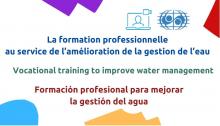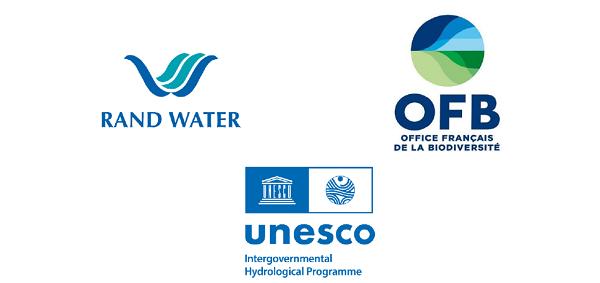

Tuesday July 6, 2021, 3:30 p.m. to 5:30 p.m. (CEST / Paris time)
With simultaneous interpretation (French - English - Spanish), on Zoom
Despite the progress made by States (on target 10 of the Millennium Development Goals, on Sustainable Development Goal n°6), Integrated Water Resources Management (IWRM) remains very imperfectly implemented (with a score of 54%1), more than half of the world's population still do not have safely managed sanitation services, and more than 2 billion people still do not have access to safely-managed drinking water2.
Substantial funding is allocated to improve the situation, including the 9.3 billion dollars in Official Development Assistance allocated to the sector for 2019 alone3. These funds primarily target the infrastructure necessary for water and sanitation services and water resource management.
But this funding still too often neglects capacity building through vocational training. This is a particularly glaring problem for the viability of these hydraulic infrastructures, when we know that 85% of States consider that they do not have sufficient human resources to implement their plans for access to water and sanitation4. More broadly, and beyond just water and sanitation services, it is a problem that contributes to the unsustainable management of water resources by all of its uses (domestic but also agricultural and industrial).
In a period of strong budgetary constraints, it is therefore vital to meet the growing demand for qualified personnel in order to optimize the investments made for water management (of rivers, lakes and aquifers, but also of municipal water and sanitation services) and optimize its uses.
This webinar aims to present the roles that training systems and donors can play for capacity building in the water sector and for all of its uses.
Program
Opening
- Dr. Eric Tardieu, Secretary General, International Network of Basin Organizations (INBO)
Introduction and thematic framework: evolution of training needs in the water sector at international level
- Mr. Joseph Pronost, Director of training and educational engineering, International Office for Water (OiEau)
Introduction
(Vocational) training of professionals, a priority for financing
- Ms. Hendrina Chalwe Doroba, Head of Division, Education, Human Capital and Employment, African Development Bank
Skilling and Training of Professionals, a Priority for Financing
First section of questions & answers with the participants
Intervention of great witnesses
Moderator: Mr. Sètondji Grace-Félix Hounaho, Project manager, INBO
Our key witnesses will share their experience on capacity building in the management of water resources for:
1. Municipal / domestic uses: Ms. Wayida Mohamed, Group Human Resources Executive, Rand Water, South Africa,
Human resources capacity development in the South African water and sanitation sector to address the current and future challenges?
2.Agricultural uses: Mr. Yofre Ramon Mendoza Zambrano, Principal Representative of Agricultural Users, Portoviejo Basin Council, Ecuador
Necesidades de fortalecimiento en capacidades para el uso agrícola del recurso hídrico un testimonio desde la experiencia
3. Industrial uses: : Mrs. Florence Brocard, Environment Advisor Water & Air, TotalEnergies
TotalEnergies : Needs for water training
4. Mrs. Virginia Barbancho Domínguez, Member of the team of the Permanent Technical Secretariat of the Conference of Ibero-American Water Directors (CODIA
Desarrollo de capacidades en el ámbito de la CODIA: el Programa Iberoamericano de Formació
Second section of questions & answers with the participants
Conclusion
- Mr. Abou Amani, Director of the Division of Water Sciences & Secretary of the Intergovernmental Hydrological Program of UNESCO (UNESCO-IHP)
